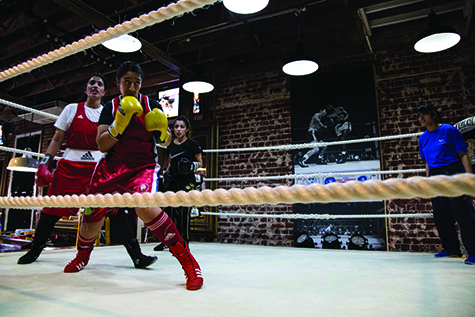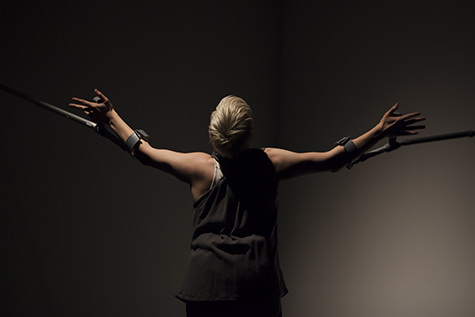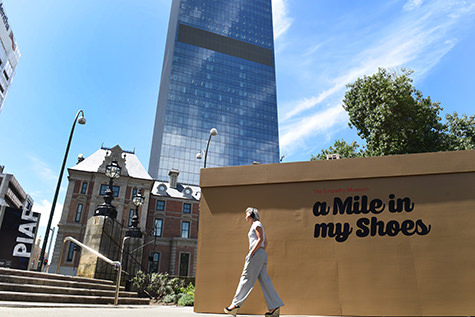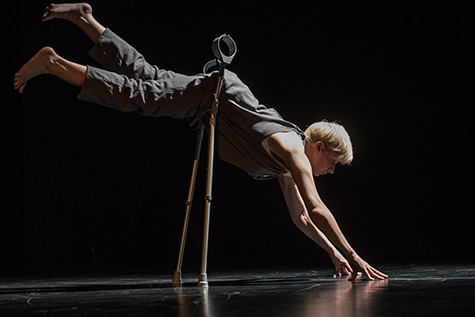Paying attention to the lives of others
Nerida Dickinson

No Guts, No Heart, No Glory, Common Wealth Theatre
photo Toni Wilkinson
No Guts, No Heart, No Glory, Common Wealth Theatre
Empathy, a key theme in the 2016 Perth International Arts Festival, is strongly in evidence in three works that challenge notions of cultural difference and disability and encourage us to pay attention to extraordinary lives.
Common Wealth, No Guts, No Heart, No Glory
From the City of Bradford, West Yorkshire, comes Common Wealth Theatre Company challenging global Islamophobia with an honest, intimate account of the lives of young Muslim women in Britain and the challenges and rewards of boxing for them in this context.
In Perth’s Queen Street Gym, with monologues, pronouncements, one-sided dialogues and protests, the performers deliver truths about the conflict between adolescence and family cultural expectations like punches in a boxing match. They declaim between blows to a punching bag, while standing on a bench before lockers, pacing under stairs or huddled on a stool behind a workout space. We hear a fighter’s internal monologue when she’s winning a bout. There are short sprints, bursts of rope skipping and more thudding whacks to punching bags. There are individual set pieces, group movement through the crowded room and choreographed ensemble work in the ring.
Each character is fighting her own demons: the claustrophobia of belonging to a small community, pressure to excel at school, anger at events in Gaza and the seeming inevitability of an early marriage to a chosen husband. A recurring theme emphasises a common desire to be “good”—good daughters, good citizens and good people. Each performer brings her story to her boxing, controlling her strength and fitness with a fierce, energetic joy. This direct expression of emotion, physical reaction and proud stories fills the gym.
Give me a reason to live, Claire Cunningham
photo Hugo Glendinning
Give me a reason to live, Claire Cunningham
Claire Cunningham, Give Me a Reason to Live
Provoking the audience to reconsider the notion of ‘ability,’ Glasgow’s Claire Cunningham stages a living memorial to the victims of the Nazi Aktion T4 euthanasia program, in which people with disabilities were murdered, as well as supporting the victims of ongoing “welfare reform” budget cuts in the UK. As in her first work in this 2016 festival, Guide Gods, so in this starkly beautiful dance piece Cunningham explores a traditional religious view of disability, motivated by the suggestion that in the work of 16th century artists such as Hieronymus Bosch cripples might represent repositories of sin.
As Cunningham moves around the space, tiny patches of light in Karsten Tinapp’s minimalist lighting design mark points for exploration of a series of movements in which she pushes her body to work with her crutches to perform amazing feats of agility, speed, strength and endurance. She holds us captivated as she steadily lowers herself towards the floor, using the crutches as a lever for her shoulder muscles, her pace slowing the closer she comes to the end point. She holds poses familiar from artistic depictions of crucifixion, her crutches a stage prop as well as physical support.

Give me a reason to live, Claire Cunningham
photo Maria Falconer
Give me a reason to live, Claire Cunningham
Time pauses as Cunningham exploits the starkness of silence. Leaving her crutches on the floor, she stands, her eyes holding each of us in turn, her breathing becoming laboured. Her face tautens with strain, her legs wobble and she pushes her limbs to their unsupported limit until dropping back to her crutches, her muscular upper body swinging her about the stage in liberation and relief. Pushing herself to the limits of her capacity, Cunningham poses against the black back wall and sings beautifully Verse 2 of Bach’s Cantata BWV 4, stirring every emotion and reminding us that there is no human who can defeat death.
The artist’s danced engagement with her crutches, her amazing feats of strength and the work’s movement from wretched moaning in a dark corner to a triumphant, defiant “Hallelujah!” from Bach at the close, create an intensely moving experience. Differently ‘accessible’ compared with her Guide Gods, Give Me a Reason to Live speaks directly through movement, imagery and sound, to old notions of sin and deformity, defying moral judgement made of those who do not meet conventional physical expectations.

A Mile in My Shoes
The Empathy Museum, Walk a Mile in My Shoes
A more literal plea for empathy and understanding is realised by The Empathy Museum (read the RealTime interview with London-based director Claire Patey) which immerses participants in fascinating life stories, sending us each on a mile-long journey through another’s experience.
Arriving at an oversized shoebox in the Stirling Gardens, each participant’s shoes are exchanged for another pair of the same size with a matching digital recording on an MP3 player. Walking while listening to the recording takes the audience member about a mile, with signs posted around the garden to advise when to turn back or to take time to sit and listen in the cool green surrounds.
Each recording is of a carefully structured first-person narrative created from an interview, complete with sound effects to set the scene. Stories include moments from the life of Margaret Watroba, a Polish-born Australian who survived an avalanche at Everest Base Camp during the earthquake in Nepal in 2015; reflections of Dianne Lawrence, the mother of two sons, one born male and one transgender; memories of John Gilmore, an ex-POW held by the Japanese; and insights from Dalwinder Singh, a Sikh taxi driver. The stories come without warning, based on your shoe size.
Each story establishes basic facts before examining points of particular interest. Gilmore was a keen runner when he was in school—his recollections of school sports days seamlessly lead to his Army enlistment. His understated description of Changi, the Japanese prisoner of war camp – “it wasn’t very nice”—is breathtaking. Similarly, Watroba’s story begins with her childhood interest in hiking, before discussing the extent of the constraints on her life in Communist Poland, her difficult defection and pursuit of her childhood dreams. Singh and Lawrence, however, tell stories about empathy, supporting others around them in order to understand themselves. Each tale is captivating in its own way, simply told and clearly recorded.
This year’s focus on empathy by PIAF’s Artistic Director Wendy Martin is stimulating, a refreshing antidote to a world steadily becoming more focused on the needs and desires of the individual.
–
2016 Perth International Arts Festival: Common Wealth Theatre Co, No Guts, No Heart, No Glory, writer Aisha Zia, director Evie Manning, Queen St Gym, 23-28 Feb; Claire Cunningham, Give Me a Reason to Live, PICA, 2-5 March; The Empathy Museum, Walk a Mile in My Shoes, curators Clare Patey and Kitty Ross in collaboration with Roman Krznaric, Stirling Gardens, Perth, 18 Feb-6 March
RealTime issue #131 Feb-March 2016, web







